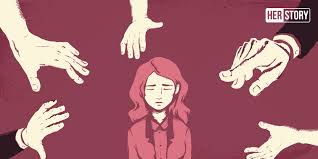For an undetermined period of time, women have been the victims of several crimes and offenses, with sexual harassment predominating in each one. According to the recent NCRB report, almost 90 women are raped every day in India. With almost 34,000 rape cases, most victims belonged to the age group of 18 to 30 years.
Women are thriving in every field, whether technical or in the healthcare industry, thanks to improvements in the educational system and chances. But what if they feel insecure at the same job? Imagine that despite your best efforts, you are the target of offensive gestures, offensive touching, jokes or pranks, intimidating behaviors, pornographic materials, repeated and unwanted requests for dates, and derogatory or sexually suggestive comments from someone you work with. Compared to how it sounds, it’s more stressful and gloomy.
PRE-VISHAKHA GUIDELINES SCENARIO
Now what if I tell you that In India, before 1997 there was no law or official guidelines for how an incident involving sexual harassment at the workplace should be dealt with by an employer? Women experiencing sexual harassment at the workplace had to lodge a complaint under Section 354 of the Indian Penal Code which deals with the ‘criminal assault of women to outrage women’s modesty’ and Section 509 which punishes an individual or individuals for using a ‘word, gesture or act intended to insult the modesty of a woman’. In 1997, The Supreme Court in a landmark judgment in the Vishakha and others v State of Rajasthan case gave ‘Vishakha guidelines’ which became the founding pillar for the Sexual Harassment of Women at Workplace (Prevention, Prohibition and Redressal) Act, 2013.
Let’s look back to the year 1992, Rajasthan
Bhanwari Devi, a social worker of the Women Development Programme in Rajasthan, India, was gang-raped by upper-caste men as punishment for her efforts to prevent child marriages. Since there was no formal law, the culprits were set free due to ignored pieces of evidence. Here it gave rise to Vishakha vs. the state of Rajasthan case where Vishakha and other women’s groups filed a PIL against the state of Rajasthan and the Union of India to enforce the fundaments rights of working women under articles 14, 19, and 21 of the constitution of India.
- The Vishaka judgment provided a framework for addressing sexual harassment in the workplace and established the legal foundation for later legislation, such as the Sexual Harassment of Women at Workplace (Prevention, Prohibition, and Redressal) Act, 2013.
- Protection of Women from Sexual Harassment (PoSH) Act, 2013 is legislation enacted by the Government of India on the issue of sexual harassment faced by women in the workplace which aims to create a safe and conducive work environment for women and provide protection against sexual harassment.
- The Ministry of Women and Child Development, the government has shared a handbook for Sexual Harassment of women in the workplace which states many guidelines which pose a responsibility to employers to ensure that women did not face a hostile environment, and prohibited intimidation or victimization of those cooperating with an inquiry, including the affected complainant as well as witnesses. This handbook deals with various scenarios to help people ensure the safety of women in the workplace.

SHE-Box which means “Sexual Harassment Electronic Box” is an innovative idea that was created for the effective implementation of the Sexual Harassment at workplace act. She-Box was launched by the Ministry of Women and child development headed by Maneka Gandhi in the year 2018. It’s a single window access for all working women whether they belong to the organized or unorganized sector, public, private, or government sector which helps them to file their case in this box. Safeguarding women in the workplace is the responsibility of the company and every employer who is part.

The summarize despite their immense contribution in every field, to the development of the nation women still have to face evils such as harassment. A nation grows when all its people are treated equally irrespective of gender, caste, or sex. Equality is not only by words or in books but in actual ground reality work where each human being can feel safe working without fear of harassment.
